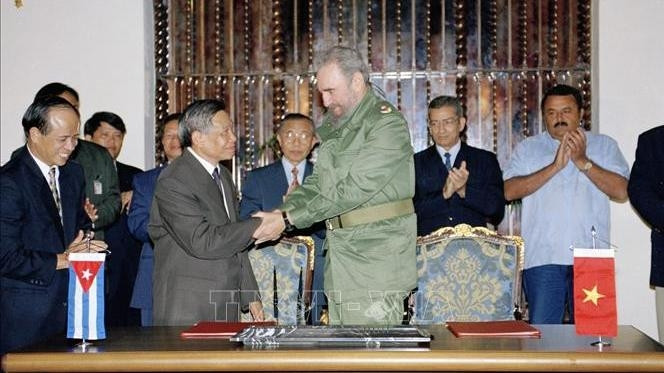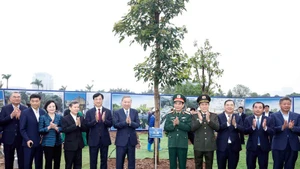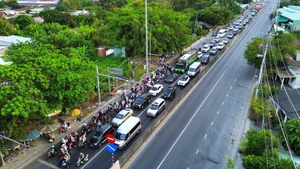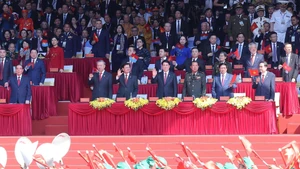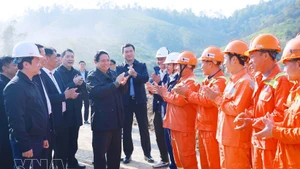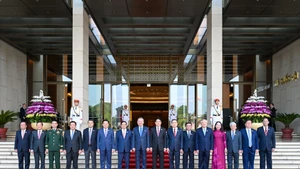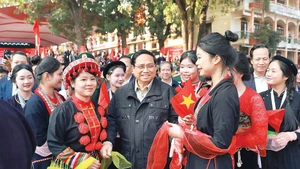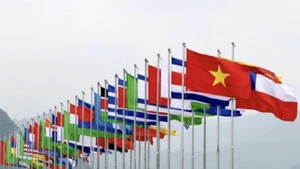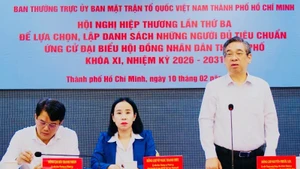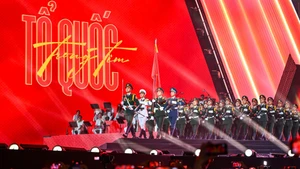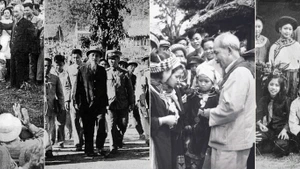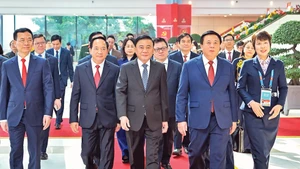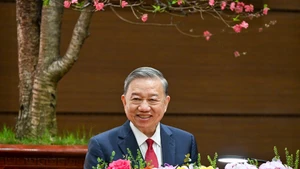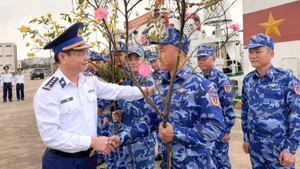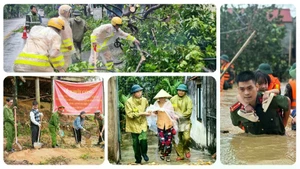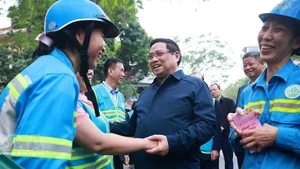Over three years as the Party General Secretary, the comrade worked closely with the PCC, Politburo, Politburo’s Standing Committee and Government to lead the cause of national renewal, industrialisation, modernisation and international integration as well as to maintain the national independence, sovereignty and security, gaining outstanding achievements.
In 1997, the financial and monetary crisis in the Southeast Asia and Asia badly affected the economies in many countries. The crisis had also a negative impact on Vietnam’s economy. The Party General Secretary, along with the Politburo and Government, set strong and effective solutions to limit external negative impacts during the process of international economic integration as well as to prevent the economy’s regression. While many countries’ economies witnessed sharp declines, Vietnam maintained economic stability. As a result, despite the decrease in the economy’s growth, the country’s GDP reached 4.8% in 1998 and has continued to increase since 1999. Vietnam successfully overcame the region’s financial, monetary and economic crisis during 1997-2000 period.
The renewal cause has achieved many successes but also revealed many difficulties and shortcomings. Instability occurred in Thai Binh Province in 1997. Former Party leader Le Kha Phieu and the Politburo have drastically and promptly formed and directed a special working group of the Politburo’s Standing Committee to stabilise the situation in Thai Binh, contributing to consolidating the Party’s leadership as well as creating solidarity and consensus among the people. Thai Binh’s incident provided many lessons, especially related to the building of the Party, political system and the relationship between the Party and people. The General Secretary clearly saw the need to enact the grassroots democracy regulations (1998). In 2001 when riots erupted in the Central Highlands region, he worked with the Politburo to prevent the dark intentions of the hostile and reactionary forces in a drastic and timely manner, while mobilising and informing the people. The proper leadership and direction of the Party and General Secretary rapidly defeated the riots, stabilised the situation and maintained and consolidated the political security in the Central Highlands and country as a whole.
Former Party General Secretary Le Kha Phieu made significant contributions to the Party building and rectification. With his strategic vision and responsibility to the Party and people, the comrade raised the issue with the Politburo, the Politburo’s Standing Committee and the PCC, and decided to issue the resolution of the eighth PCC’s sixth plenum (second time) on “some basic and urgent issues in the current Party building work”. That was a very important resolution on Party building with ten assigned tasks. They were the most fundamental issues in the building of the ruling Communist Party. The former Party chief and Politburo closely directed the implementation of the resolution and formed the Steering Committee for the implementation of the resolution, gaining very important initial results. Its highlight was the enhancement of education of Marxism-Leninism and President Ho Chi Minh’s thoughts as well as the training of the quality and morality of the cadres and party members. The Party building work was associated with studying and following President HO Chi Minh’s thoughts and morals and the implementation of Uncle Ho’s testament.
The late Party leader emphasised the study and following of Uncle Ho’s example is a regular task that must be fulfilled seriously and orderly for each Party organisation and member and cadre.
The resolution of the eighth PCC’s sixth plenum (second time) was implemented seriously, focusing on directing the fight against corruption, waste and bureaucracy. The Party committees and leaders of agencies from the central to grassroot levels had to take responsibility for fighting corruption; continuously complete policies and laws, initially those on the management of state budget, enterprises’ assets and land, in order to promote positives and limit negatives. The inspection and control of the works and responsibilities of the cadres and Party members, especially those with position and powers, were promoted. Party General Secretary Le Kha Phieu paid strong attention to the protection of internal politics to eliminate opportunistic, corrupted and degraded people in the Party’s and State’s agencies at all levels as well as preventing four risks that the national conference for the middle of the seventh PCC had warned.
The content of the resolution of the eighth PCC’s sixth plenum (second time) has a long-term strategic significance for the Party building and implementation of the Party’s leadership role. Later, the resolutions of the 11th PCC’s fourth plenum and the 12th PCC’s fourth plenum were inherited and developed from the resolution of the eighth PCC’s sixth plenum (second time). The basic point of view was a direct look at the truth, clarification of the truth, assessment of the truth, and the close combination between building and resistance. Accordingly, the building was the long-term strategic fundamental task that would foster the Party’s ideals and the goal of revolutionary cause. They emphasised the building and firm protection of the Party’s ideological foundation; the building of quality and morality among the communists and the responsibility to set the example of cadres and party members; and repelling the degradation and the manifestation of “self-evolution” and “self-transformation” inside the Party. The effective fight against corruption was highlighted in the resolution. In 1999, the Steering Committee for the implementation of the resolution of the eighth PCC’s sixth plenum (second time) was formed and led by former Party leader. Meanwhile, now the Central Steering Committee for Anti-Corruption, led by the Party chief, plays a very important role. The urgency in Party building can be seen as the determination to fight against degradation, negatives and corruption inside the Party and Stata apparatus. The resolution of the 12th PCC’s fourth plenum noted that the shortcomings and negatives in Party building of several cadres and Party members would “reduce the leadership role of the Party, hurt the people’s feelings and reducing the people's confidence in the Party,” and become a direct threat to the survival of the Party and the regime”.
Party General Secretary Le Kha Phieu has made important dedications to the diplomatic front and international integration. He, along with the Politburo, led the State and Government to pay special attention to consolidating the friendship with neighbouring countries sharing a border line with Vietnam as well as expanding the relations with other countries in the continent with the perspective of Vietnam acting as a friend of all nations around the world. General Secretary Le Kha Phieu paid an official visit to Laos on March 5, 1998; to China on January 25, 1999; to Cambodia on June 9, 1999; and to Cuba on July 7, 1999. On May 21, 2000, he visited France, Italy and the European Commission. The General Secretary led the enhancement of negotiation process for the singing of the land border agreement between Vietnam and China.
As the Party General Secretary in the final years of the 20th century, turning to the 21st century and preparation for the ninth National Party Congress, comrade Le Kha Phieu worked with the Politburo to lead the review of the Party’s 70-year-leadship (January 3, 1930-2000), Vietnam’s revolution in the 20th century and 15 years of renewal. The important reviews, which had theoretical and practical significances in affirming the country’s position, were associated with the role and close and methodical direction of General Secretary Le Kha Phieu. The document of the Party's Ninth Congress (April 2001) clearly showed these important reviews.
